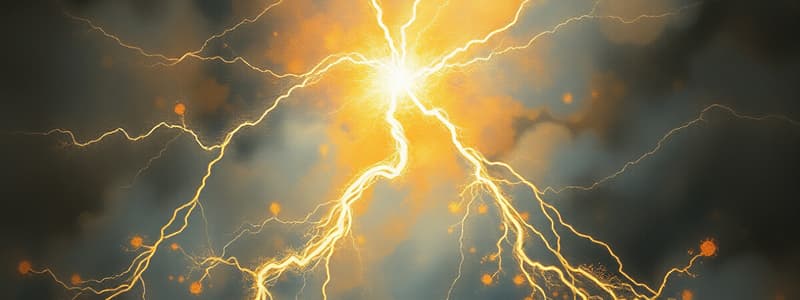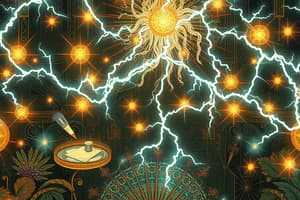Podcast
Questions and Answers
What is a static charge?
What is a static charge?
- An electric charge that builds up due to an imbalance between electrons and protons (correct)
- A constant electric current flowing through a conductor
- An electric charge that is always neutral
- None of the above
What does it mean for an object to be discharged?
What does it mean for an object to be discharged?
To remove all excess static electric charge so that the object's charge is neutral.
Charged objects can exert a push or pull on one another.
Charged objects can exert a push or pull on one another.
True (A)
What happens during repulsion?
What happens during repulsion?
What is attraction in terms of charged objects?
What is attraction in terms of charged objects?
What effect does distance have on the force of charge?
What effect does distance have on the force of charge?
Protons have a ____________ charge.
Protons have a ____________ charge.
Electrons have a ____________ charge.
Electrons have a ____________ charge.
Neutrons have ____________ charge.
Neutrons have ____________ charge.
Protons and neutrons each have __________ the mass of an electron.
Protons and neutrons each have __________ the mass of an electron.
What does charging by friction involve?
What does charging by friction involve?
What is charging by induction?
What is charging by induction?
What is charging by conduction?
What is charging by conduction?
What is an insulator?
What is an insulator?
What is a conductor?
What is a conductor?
What does it mean to be grounded?
What does it mean to be grounded?
What causes lightning?
What causes lightning?
Flashcards are hidden until you start studying
Study Notes
Static Electricity Concepts
- Static Charge: Imbalance of electrons and protons resulting in electric charge accumulation.
- Discharged: Process of neutralizing an object's excess static electric charge.
- Law of Electric Charges: States that charged objects exert forces (push or pull) on each other.
Interactions Between Charged Objects
- Repulsion: Occurs when like charges push away from each other (same charge).
- Attraction: Occurs when opposite charges pull towards each other; charged objects can also attract neutral objects.
Factors Influencing Electric Force
- Greater charge increases the force between objects; increasing distance decreases the force.
Fundamental Particles and Their Charges
- Protons: Positively charged particles.
- Electrons: Negatively charged particles.
- Neutrons: Neutral particles with no charge.
- Protons and neutrons each possess approximately 2000 times the mass of an electron.
Charging Methods
- Charging by Friction: Involves two objects rubbing together transferring electrons; protons remain stationary (e.g., walking on carpet).
- Charging by Induction: A charged object influences a neutral object to rearrange its electrons without direct contact; total charge remains unchanged.
- Charging by Conduction: Involves direct contact, leading to electron transfer from a charged object to a neutral object.
Materials in Electricity
- Insulators: Materials that tightly bind electrons, preventing movement (e.g., plastic, rubber, wood).
- Conductors: Materials that allow electrons to move freely (e.g., metals like copper and gold).
Grounding and Lightning
- Grounded: An object connected to the earth via a conductor, allowing excess charge to dissipate.
- Lightning Formation: Results from static charge build-up in clouds through friction among water droplets, leading to discharge when charges equalize with the ground.
Studying That Suits You
Use AI to generate personalized quizzes and flashcards to suit your learning preferences.




